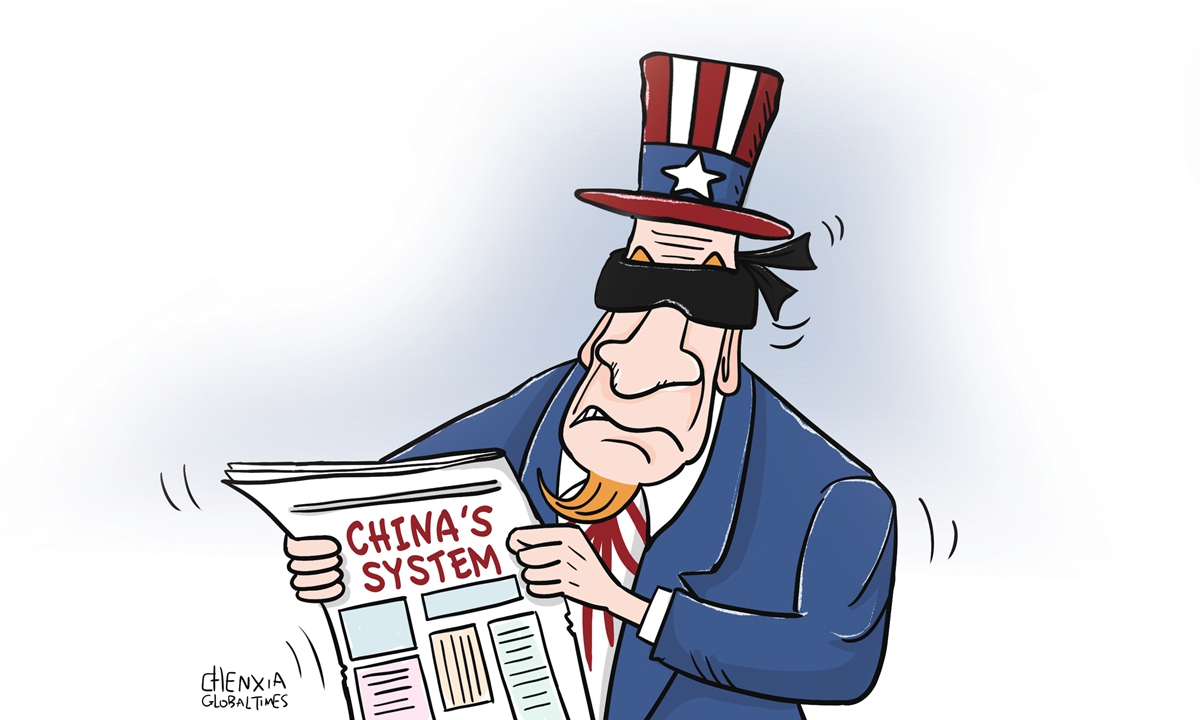Shanghai speed in handling of epidemic flare-up a hint of China’s system

Misreading China's system Illustration: Chen Xia/GT
On October 31, the Shanghai Disney Resort suddenly shut down after a confirmed COVID-19 case was found to have visited there one day earlier. This news was quickly reported by media globally.
Here started another story about China's epidemic prevention, and what happened next? Let's take a look at the timeline first.
At 5 pm on October 31, Shanghai was notified that a new COVID-19 case from Hangzhou, Zhejiang Province had spent nearly 11 hours at the Shanghai Disney Resort the day before. Ten minutes later, the park was closed.
At 5:30 pm, a large number of medical personnel, police officers and volunteers arrived at the park. The resort then issued a notice within 30 minutes that all visitors needed to undergo nucleic acid testing upon leaving the park.
At 6:20 pm, the Shanghai municipal government issued an emergency notice about the situation. And 40 minutes later, after the notice went around the whole city, all personnel entering the park during the previous two days were requested to undergo nucleic acid testing immediately. The Shanghai Metro then suspended its operation service of the Disney Resort station, while more than 220 buses arrived at the resort, ready to take the visitors who had done the nucleic acid testing home.
At 10 pm, the testing of more than 20,000 visitors was completed. By the next morning, the number reached 30,000.
On November 3, the Shanghai Disney Resort reopened to the public after a two-day shutdown.
During the time, the work, study and life of other people in Shanghai were not affected. This is China's speed.
In recent years, more and more people have increasingly understood China's speed, including building high-speed railways, skyscrapers, bridges and tunnels, the delivery industry, poverty alleviation, green development and GDP growth. This time, the world has witnessed the efficiency of China's epidemic prevention and control reactions. Behind all these cases and data are the working methods and spirit of the Chinese people. This magnifies the Chinese governance and management methods.
A comprehensive understanding of China's political system should start from these specific areas, rather than simply attribute China's system to outdated concepts with a Cold War mentality. US leaders always talk about competition with China. They, as well as some Western elites, are constantly emphasizing that they cannot allow the Chinese system to defeat that of the US.
In fact, the specific manifestation of the system includes the detailed methods of governance and management. If the US' coronavirus prevention is to compete with the speed of China shown by Shanghai Disneyland's case, the US will definitely find it difficult to win. And the US is not able to learn from China's governance methods. That being the case, if the US still places China, a country with a different system, on its opposite side, this will only show that US' narrow-minded hegemonism is at work.
The US system has its own advantages; otherwise, it would not be the strongest country in the world. On the other hand, China also has its own advantages that others may find hard to compare, and even impossible to learn from.
But the world is developing. Most importantly, the world is moving beyond the constraints of a single institutional evolution set by the West. There is no system in the world that is omnipotent and eternally powerful. The key is to keep pace with the times. Each country's system has its own history and is unique. It therefore is meaningless to compare two countries' systems without considering these facts.
If a country always believes that its system is universal and should be imitated by other countries, and it forces other countries to copy its system, and regards the relationship between different systems as competition between rivals, it will surely live with anxiety and strain. After all, diversity is the dominant development trend of globalization. Many emerging countries will have more capacity and opportunities to find political systems that suit their development practices.
In fact, the real challenge of the 21st century is not competition between different systems. It is whether countries with different systems, especially big countries, can find a path toward peace, cooperation and common development.
The author is a senior editor with People's Daily, and currently a senior fellow with the Chongyang Institute for Financial Studies at Renmin University of China. dinggang@globaltimes.com.cn. Follow him on Twitter @dinggangchina


